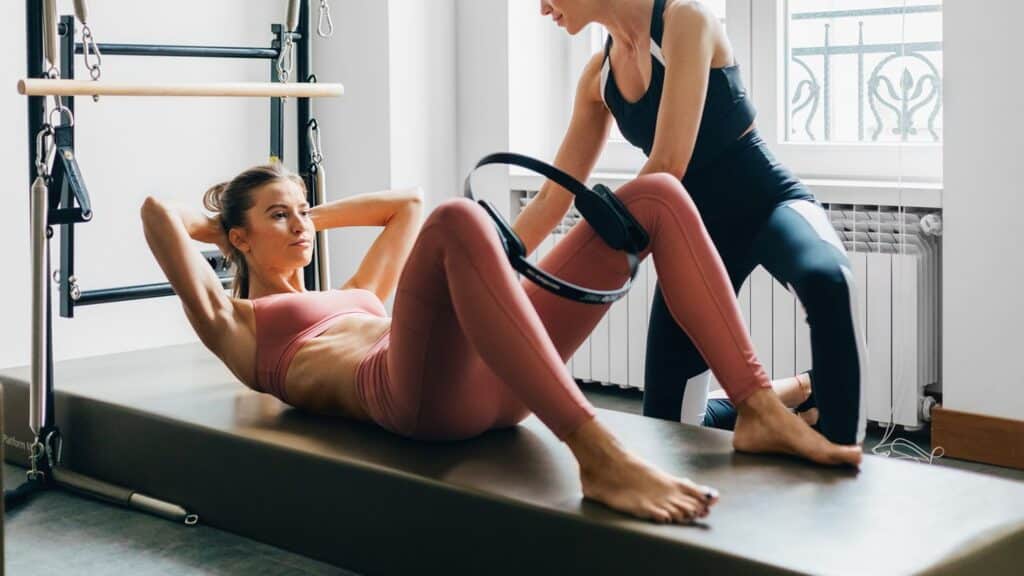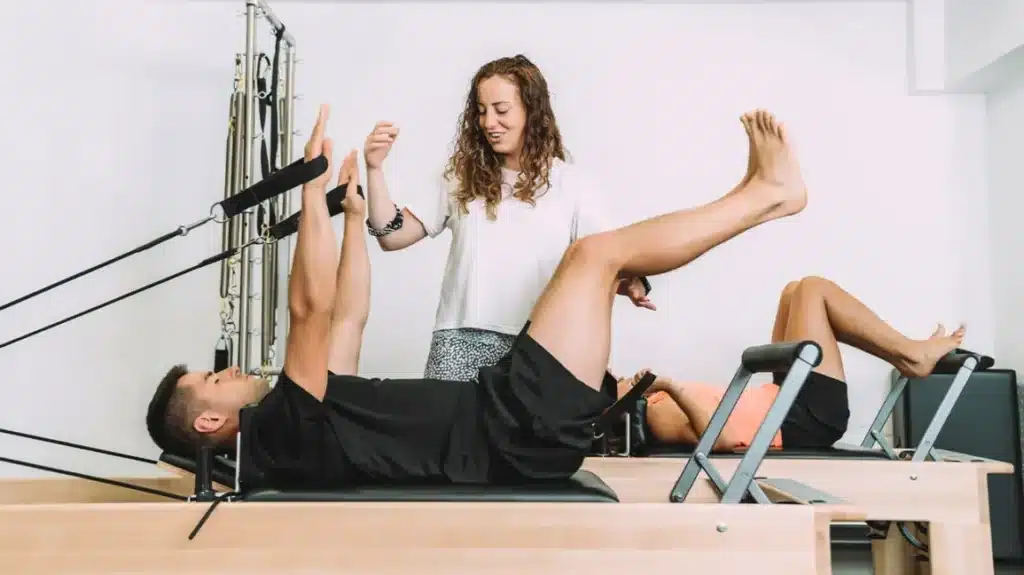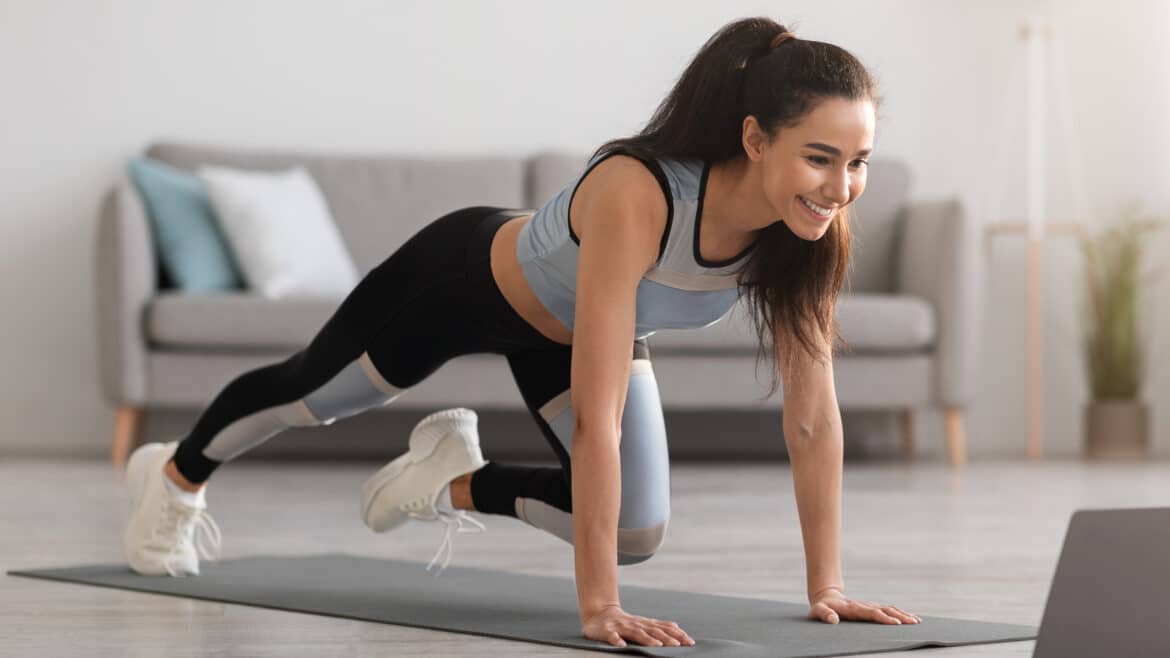Introduction
Is It Okay To Do Pilates Everyday: It’s essential to consider your fitness level. If you’re new to Pilates or have underlying health issues, it’s advisable to start slowly and consult with a qualified instructor or healthcare professional. Beginners may find it challenging to perform Pilates daily due to the initial muscle soreness and adaptation phase. However, as you progress and become more accustomed to the exercises, you might be able to increase the frequency.
The intensity of your Pilates routine also matters. There are various Pilates styles, ranging from gentle mat exercises to more vigorous reformer-based workouts. High-intensity Pilates workouts every day may not be suitable for everyone. It’s crucial to strike a balance between challenging your body and allowing it time to recover. Listening to your body is paramount. Pay attention to how your muscles and joints feel after each session. If you experience excessive fatigue, soreness, or any discomfort, it might be a sign that you need to incorporate rest days into your routine. Adequate rest and recovery are essential for muscle repair and growth, which is crucial for improving strength and flexibility.
Whether it’s okay to do Pilates every day depends on individual factors. While some people may benefit from daily practice, others may find it more beneficial to include Pilates in their weekly fitness regimen alongside other forms of exercise. Ultimately, the key is to prioritize safety, listen to your body, and consult with a qualified instructor or healthcare professional to create a personalized Pilates plan that suits your needs and goals.

What happens if I do Pilates everyday?
One of the best things about doing Pilates every day is that you’ll quickly start to see improvements in your form. This is due to the fact that you’ll become more familiar with the correct way to do each exercise, and your body will start to automatically follow these movements. You’ll avoid injuries.
Improved Core Strength: One of the primary goals of Pilates is to strengthen the core muscles. By practicing Pilates daily, you can significantly enhance your core strength, which can lead to better posture and reduced risk of back pain.
Increased Flexibility: Daily Pilates sessions can help improve your flexibility by lengthening and elongating muscles. This increased flexibility can lead to improved range of motion and reduced risk of injury.
Enhanced Mind-Body Connection: Pilates emphasizes the mind-body connection, promoting mindfulness and awareness of movement. Daily practice can deepen this connection, leading to better body control and coordination.
Better Posture: Pilates encourages proper alignment of the spine, which can help you develop and maintain better posture. Over time, daily practice can lead to a more upright and balanced posture.
Stress Reduction: Like other forms of exercise, Pilates can be a great stress reliever. Daily practice can help you manage stress more effectively, leading to improved mental well-being.
How many times a week should I do Pilates?
3-5 times per week
So, how many times a week should you do Pilates? To reap the best benefits, you’ll want to do it 3-5 times per week. However, you may not want to do it every day of the week because your muscles need time to recover.
Beginners: 1-2 Times a Week
If you’re new to Pilates, it’s advisable to start slowly. Beginning with 1-2 sessions per week allows your body to adapt to the movements and build a solid foundation. This frequency provides enough consistency to experience some benefits while reducing the risk of overexertion or injury.
General Fitness and Maintenance: 2-3 Times a Week
For individuals looking to maintain their overall fitness and enjoy the many benefits of Pilates, 2-3 sessions per week are often recommended. This frequency allows you to work on your core strength, flexibility, and posture while leaving room for other forms of exercise and activities.
Specific Goals: 3-4 Times a Week
If you have specific fitness goals, such as improving core strength, flexibility, or rehabilitation after an injury, you may want to consider 3-4 Pilates sessions per week. This increased frequency can expedite progress and help you achieve your objectives more quickly.
Athletes and Advanced Practitioners: 4-6 Times a Week
Athletes and experienced Pilates practitioners who aim for advanced levels of fitness may benefit from practicing Pilates 4-6 times a week. This higher frequency allows for targeted training and deeper exploration of Pilates techniques.
Can I do 20 minutes of Pilates everyday?
Commit to a 20-minute Pilates practice regularly, and you’ll see improvements in your overall fitness and focus. And yes, Pilates, unlike weight lifting or some other exercises, is safe to do every day!
Accessibility and Consistency
One of the primary benefits of a 20-minute Pilates routine is its accessibility. Most people can find a spare 20 minutes in their day, making it easier to establish and maintain a consistent practice. Consistency is key when it comes to exercise, and a daily routine ensures that you are continually working on your fitness goals.
Core Strength and Stability
Pilates is renowned for its ability to strengthen the core muscles. A daily 20-minute session can help you build and maintain core strength, which contributes to better posture, reduced risk of back pain, and improved overall stability. Consistent core workouts can positively impact your daily activities and help you maintain a healthy spine.
Improved Flexibility
Pilates emphasizes flexibility and stretching exercises that help lengthen muscles and increase range of motion. Practicing Pilates daily for 20 minutes can gradually enhance your flexibility, making it easier to move freely and perform other physical activities.
Stress Reduction
Exercise, including Pilates, has been shown to reduce stress and improve mental well-being. A daily 20-minute Pilates session can serve as a mini-break from the stresses of daily life, allowing you to clear your mind and focus on your breath and movement.
Is it okay to do the same Pilates every day?
By providing variety within the workouts, ensuring not to over-stress one particular body part in a single session, and not repeating the same routine over and over again, Pilates provides a regime that can be safely undertaken daily.
Plateau Effect: Repeating the same exercises daily can lead to a plateau in progress. Your body may adapt to the routine, resulting in slower improvements over time.
Overuse Injuries: Focusing on the same muscle groups every day can lead to overuse injuries, such as strains or imbalances. It’s essential to provide adequate rest and variety to prevent these issues.
Boredom: Performing the same routine can become monotonous, potentially causing you to lose motivation or interest in your practice.
Imbalanced Workout: Pilates aims to address the whole body, including different muscle groups. Repeating the same routine may neglect certain areas and lead to muscle imbalances.
Is it OK to do Pilates 7 days a week?
Is it like weight training in that you need to rest your muscles for 48 hours between workouts? Pilates is safe enough to do every day. Initially you may want to do it every day so you get a rhythm and become consistent; then a good goal is to do it every other day.
Consistency: A daily Pilates routine ensures consistency in your fitness regimen, which can be essential for achieving and maintaining fitness goals.
Increased Progress: Practicing Pilates every day can lead to faster progress, especially if you’re looking to build core strength, improve flexibility, or target specific fitness goals.
Mind-Body Connection: Daily Pilates sessions deepen the mind-body connection, enhancing body awareness, balance, and coordination.
Stress Reduction: Pilates, like other forms of exercise, can be an effective stress reliever. Daily practice provides daily stress relief and mental clarity.
Routine and Discipline: A daily practice can instill discipline and structure in your life, as you commit to setting aside time for exercise each day.
Why am I not seeing results from Pilates?
One of the main reasons you may not be feeling or seeing the results of your Pilates workouts is your consistency, or lack thereof. While you may be getting some benefits from yo-yoing from 5 classes one week, to a two week break, you’ll find far greater results from building a solid foundation from the get go.
Inadequate Consistency
Consistency is key in any fitness program. If you are not practicing Pilates regularly, you may not see the expected results. Aim for a consistent practice schedule that aligns with your goals and lifestyle. Missing sessions or practicing sporadically can hinder your progress.
Insufficient Intensity
Pilates can be adapted to various fitness levels, but if your routine lacks intensity, you may not see significant results. Ensure that your Pilates sessions challenge you and progressively increase the difficulty of exercises over time. Consult with a certified Pilates instructor to design a program that aligns with your fitness goals.
Lack of Variety
Repeating the same Pilates routine without variation can lead to plateaus. Your body may adapt to the exercises, resulting in slower progress. Incorporate different exercises, equipment, or variations to keep your routine fresh and engaging.
Poor Form and Technique
Proper form and technique are crucial in Pilates. If you’re not performing exercises correctly, you may not activate the intended muscle groups, which can limit your progress and even lead to injury. Consider working with a certified instructor who can provide feedback and guidance on your form.
Can you get in shape with Pilates?
Pilates is an effective low-impact workout. It can be beneficial for toning up muscles, toning the core, and improving posture. It may also help with recovery from back pain and other injuries by strengthening the affected area. If you’re looking to lose weight, you can incorporate Pilates into your wellness plan.
Enhanced Balance and Coordination
Pilates emphasizes controlled and precise movements, enhancing your balance and coordination. This improvement in balance can be especially beneficial for daily activities and sports.
Stress Reduction
Like other forms of exercise, Pilates can be an excellent stress reliever. Focusing on your breath and movement during a Pilates session can help reduce stress and promote relaxation.
Weight Management
Pilates can be a part of a weight management strategy. While it may not be as calorie-burning as some other forms of exercise like cardio, it can contribute to overall physical fitness, making it easier to maintain a healthy weight when combined with a balanced diet.
Customizable for All Fitness Levels
Pilates is adaptable and can be tailored to suit various fitness levels and goals. Whether you are a beginner looking to build a foundation or an experienced athlete aiming to enhance your performance, Pilates can be modified to meet your specific needs.
Is Pilates 5 days a week too much?
Ultimately, you should listen to your body when you first start Pilates to determine whether you need to take an extra day or rest or even cut a workout short. However, after some practice, recovery times will shrink, and you can begin growing your workout routine to 4-5 days per week.
Variation: Repeating the same Pilates routine daily can lead to plateaus in progress. Incorporating variety in your routine by including different exercises, equipment, or modifications can help prevent boredom and stimulate continuous improvement.
Overtraining: Intensive Pilates practice five days a week may increase the risk of overtraining. Overuse injuries, muscle fatigue, and burnout can occur if your body doesn’t have sufficient time to rest and recover between sessions.
Individual Fitness Level: Novices or individuals new to Pilates may find five days a week too demanding initially. It’s advisable to start with a lower frequency and gradually increase it as your strength and stamina improve.
Goals: The number of days you should practice Pilates depends on your fitness goals. If you have specific objectives, such as rehabilitation or preparing for an event, you may require more frequent practice. However, for general fitness and well-being, a balanced routine that includes rest days is often more sustainable.

Conclusion
Your individual fitness level plays a significant role. Beginners or individuals with underlying health issues may find daily Pilates too demanding initially. Starting slowly, with guidance from a qualified instructor or healthcare professional, is essential to prevent overexertion and injury. As you progress and your body adapts, you may be able to increase the frequency of your practice. The intensity and type of Pilates exercises you perform also matter. There are various Pilates styles, and some are more strenuous than others. High-intensity Pilates workouts every day may not be sustainable for everyone.
It’s crucial to strike a balance between challenging your body and allowing it adequate time to recover. Incorporating rest days into your routine is essential to prevent muscle fatigue and promote optimal muscle repair and growth. Listening to your body is of utmost importance. Pay attention to how your muscles and joints feel after each session. If you experience excessive fatigue, soreness, or discomfort, it’s a sign that you might need to scale back or include rest days in your routine. Ignoring these signals can lead to overtraining and potential injuries.
The decision to practice Pilates every day should be made with careful consideration of your goals, physical condition, and individual preferences. Some people may find daily Pilates practice beneficial for improving core strength, flexibility, and overall well-being, while others may achieve their desired results with a less frequent routine.

